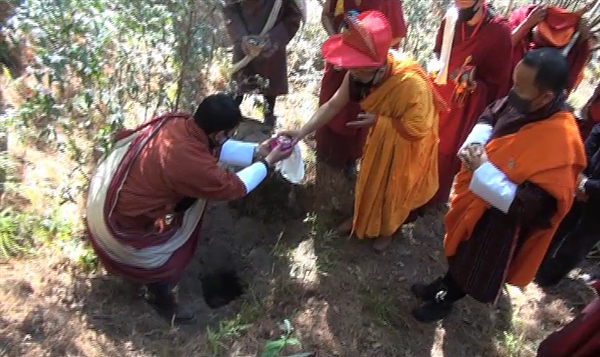 Access to sufficient drinking and irrigation water has been a major challenge for most farmers in the country. The situation is no different for the villagers of Gomo and Sengkha village under Nagya Gewog in Paro. However, with the launch of the DeSuung National Service Water project in the area, all the households in the villages are expected to have reliable water after a few months.
Access to sufficient drinking and irrigation water has been a major challenge for most farmers in the country. The situation is no different for the villagers of Gomo and Sengkha village under Nagya Gewog in Paro. However, with the launch of the DeSuung National Service Water project in the area, all the households in the villages are expected to have reliable water after a few months.
The DeSuung National Service Water project in partnership with the government kicked off in the gewog on Sunday.
Water taps can be seen near almost all households. But the two villages depend solely on a lone water source. The spring water is used for drinking, watering the garden and feeding the livestock.
“I have settled in Sengkha some three decades ago. At that time, there were only three households in Gomo and two in Sengkha. But now, there are over 30 houses,” said Penjor, a farmer from Sengkha village.
“Whenever there is a water shortage in Sengkha village, we were blamed for misusing the water. It is because our village is near to the water source. We use to quarrel because of water. But soon after the project is complete, the problem will be eased,” said Chencho Tshering from Gomo village.
“We end up blaming each other although we are under one gewog. The people of Gomo use the water for gardening whereby we don’t have enough drinking water. This kind of problem arises especially at this time of the year when it is a dry season,” said Karma Tshering from Sengkha village.
The villages are located in a sloppy area. The people living downhill can access enough water while others living towards the top of the slope receive less water due to the limited water force.
“We will bring water from an additional water source as well. With this, I am thinking that they will be able to use it for gardens too,” said the Gup, Kinley Wangdi.
Villagers said that any kind of crops can be grown in the area if there is enough irrigation water.
“If we have enough water, we can grow any kind of crops and vegetables. We can grow even oranges and other vegetables that grow at a low altitude. For now, we are able to focus on a few commodities which require less water,” said Passang, a farmer from Gomo village.
Hundred and three DeSuups will be carrying out the works over a period of three months. The project will construct water intakes, reservoirs, water taps and about 7.2 Kms of the water transmission line.
The project will cost Nu 4.6 M. Once complete, over 1,000 people of Nagya Gewog will be benefitted.
Namgay Wangchuk, Paro





